#EXEGI MONUMENTUM
Explore tagged Tumblr posts
Text
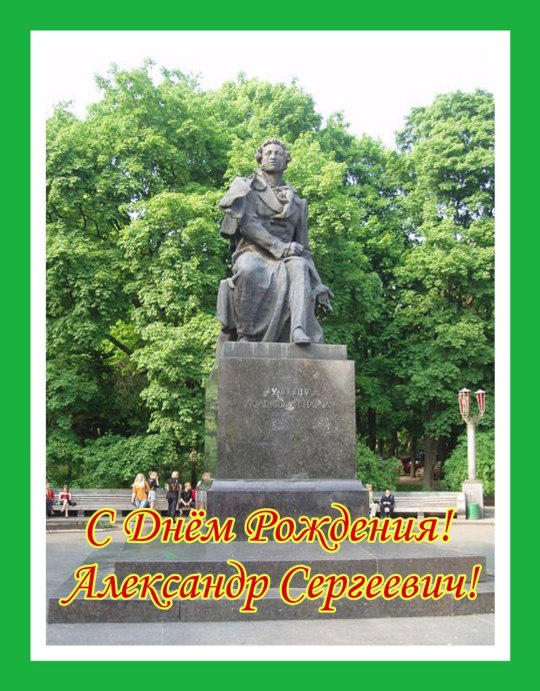
EXEGI MONUMENTUM!
#alexander pushkin#в родном городе#pushkins park#киев город#день рождения Пушкина#киев#tumblr milestone#Олександр Пушкін#День Народження#З Днем Народження!#Микола Зеров#Зеров#я памятник себе воздвиг#киевские парки#Парк Пушкина#EXEGI MONUMENTUM
0 notes
Text
5 More Latin Phrases
to try to include in your poem/story (again)
Over the centuries, certain Latin phrases have been used widely enough in English to get included in the dictionary.
Aere Perennius
"More lasting than bronze"
In the final poem in his third book of Odes, Horace boasts that his poetry will outlive any manmade monument:
"Exegi monumentum aere perennius." ("I have made a monument more lasting than bronze.")
Given that his words continue to be used two thousand years later, perhaps he's right.
Caveat Emptor
"Let the buyer beware"
In early Roman law, sales of goods were governed by caveat emptor: buyers were advised to scrutinize the goods before purchase, because sellers had few obligations.
Over time, the imperative of caveat emptor has been softened by warranties, both express and implied.
Caveat has been adopted directly into English, and has a small range of meanings, including "a warning enjoining one from certain acts or practices" and "an explanation to prevent misinterpretation."
Emptor has likewise been taken directly into the English language, although the word is far less common than caveat; it has retained the rather narrow meaning of "buyer, purchaser."
Per Angusta Ad Augusta
"Through difficulties to honors"
These four words have inspired students and soldiers for centuries.
Alternative translations include "through trial to triumph" and "through difficulties to great things."
Post Hoc, Ergo Propter Hoc
"After this, therefore on account of it"
This refers to the logical mistake of claiming that one thing caused another just because it happened first.
For example, the rooster crows and the sun rises - but to argue that the rooster's crowing causes the sun to rise would be post hoc, ergo propter hoc reasoning.
It was Aristotle who laid the groundwork for classifying bad arguments based on logical errors like this one.
Si Monumentum Requiris, Circumspice
"If you seek his monument, look around"
It took 35 years to complete London's magnificent St. Paul's Cathedral.
When its architect, Sir Christopher Wren, died twelve years later in 1723, he was entombed inside, under a simple slab of black marble.
Wren's son placed a dedication nearby, which contains the words "Lector, si monumentum requiris, circumspice" ("Reader, if you seek a monument, look around you").
The phrase is generally used to describe a person's legacy - and can be taken to mean that what we leave behind (including intangible things like relationships) best represents our life.
If any of these phrases make their way into your next poem/story, please tag me, or leave a link in the replies. I would love to read them!
Latin Phrases pt. 1
#writing prompt#writeblr#spilled ink#writers on tumblr#poets on tumblr#literature#poetry#words#lit#writing challenge#latin#langblr#studyblr#dark academia#writing tips#writing inspo#writing ideas#writing inspiration#writing reference#writing resources
157 notes
·
View notes
Text

June 6 is the Birthday of A.S. Pushkin - "the Sun of Russian poetry", and today's the 225th anniversary :) And timed to it is the Russian Language Day - congrats to my fellow folks!
Exegi monumentum
A monument I've raised not built with hands, And common folk shall keep the path well trodden...
#Пушкин Александр Сергеевич#Alexander Pushkin#literature#poetry#books#classic literature#portrait#art#illustration#PhantomRin
70 notes
·
View notes
Text
Horoskop
Jagna Sosjerka, 30.04.2024
Horoskop na następny miesiąc dla wszystkich znaków zodiaku. Nie wystarczy słuchać głosu Wegi. Musisz przekazywać jej słowa dalej.
Horoskop na maj - Baran (21 marca - 19 kwietnia) Żeby nadrobić za zeszły miesiąc, masz tym razem 2 horoskopy: - Nadchodzi czas trudnych decyzji. W niedalekiej przyszłości zmierzysz się z problemem, który będzie wymagał od ciebie dużo wysiłku. Musisz zachować spokój i pamiętać, że są ludzie, na których możesz polegać. - Najbliższy miesiąc będzie spokojny, tak długo, jak nie będziesz ufać nikomu. Rozluźnij się, ale uważaj na siebie.
Horoskop na maj - Byk (20 kwietnia - 20 maja) Mam nadzieję, że nadal patrzysz w górę. Jeśli tak, to nie przestawaj. Serio, nie. Nie patrz w dół. NIE PATRZ W DÓŁ
Horoskop na maj - bliźnięta (21 maja - 20 czerwca) Jebać bernadetę żmijowiec
Horoskop na maj - Rak (21 czerwca - 22 lipca) Nie jedz tego mięsa. Wiem, że wygląda dobrze, ale będziesz chorować, jeśli je zjesz.
Horoskop na maj - Lew (23 lipca - 22 sierpnia) Jeśli czekasz na znak od losu, oto i on. Ja jestem los. Ten znak to D-1.
Horoskop na maj - Panna (23 sierpnia - 22 września) Vouloir, c'est pouvoir, exegi monumentum aere perennius, kaiidth.
Horoskop na maj - Waga (23 września - 22 października) Czerwone niebo. Pełnia Słońca, księżyc w zenicie. Kolorowe gwiazdy na szarym tle. Ty i Twój koń w miejscu przecięcia dwóch wielkich rzek.
Horoskop na maj - Skorpion (23 października - 21 listopada) Wychodź więcej na słońce, tylko pamiętaj o kremie z filtrem. Nie przesadzaj też z witaminami, zwłaszcza tymi rozpuszczalnymi w tłuszczach.
Horoskop na maj - Strzelec (22 listopada - 21 grudnia) Ok, ktoś musi Ci to powiedzieć. Kolejny rewatch Naruto to nie jest dobry, ani zdrowy sposób spędzania czasu. Za to robienie dioram owszem.
Horoskop na maj - Koziorożec (22 grudnia - 19 stycznia) x
Horoskop na maj - Wodnik (20 stycznia - 18 lutego) Ok, musimy sobie coś wyjaśnić.��
Horoskop na maj - Ryby (19 lutego - 20 marca) GAY SEX GAY SEX GAY SEX GAY SEX
#horoskop#kłykcie#kłykcie lewe#polska wieś#polska#wieś#polish tag#poland#polish#polblr#polski tumblr#polskaposting#polandposting#polishcore#polishposting#oc#oc writing#mockumentary#parody#unreality
31 notes
·
View notes
Text
The Almost-Immortality.
"Non omnis moriar."
Stories tell of a half-god king. He was three times the average man in height. He was broad like two bulls standing one behind another.
Stories tell of the king's strength and arrogance, but was sent an equally strong beast—by the gods—to temper the king’s defiance.
The two met in a fight and engaged in a bloody brawl. They became friends after neither the king nor the beast could defeat the other.
The Epic of Gilgamesh is one of the oldest human-written records. The people who wrote it on a clay tablet have been underground, beyond dust and ashes, for about 4,100 years.
This epic, and many others that came before and after, is a testament to how humans have begun cheating death. Cheating it for its right to take what is ours. Our feelings and thoughts, experiences and adventures. Our loved ones, our very soul.
We grieve in the process of separation by death. We yearn to see those who have passed, the ages gone by. Thus why, stories, especially those written, are the results of that grief and a challenge to death.
It is a direct message from the past: My body might’ve passed, but my spirit will linger far longer.
Horus, the Roman poet, said in his famous Odes,
“Exegi monumentum aere perennius.”
“I have erected a monument more lasting than bronze.”
For it’s the act of writing stories on a piece of parchment or a tablet of mud that we reach a state of an almost-immortality.
The stories we write today might survive to reach a time extending to four millennia. And maybe your story, poem, essay, or calm reflection on a cool night will be among them.
Then they’ll know that though your body has decayed, your spirit remains in your words.
#writing#writers on tumblr#writingcommunity#writingjourney#tumblr writers#writing tips#writerlife#creative writing#poetry#poem#the epic of gilgamesh
2 notes
·
View notes
Text
Miss the times I didn't have to worry about long-time finances, careers, home ownership, and running low on quality eggs so that I can say exegi monumentum, but also dying in labor? All this awful responsibility and regretting decisions made and actions both taken and forfeited and painfully realizing in the end it all boils down to chance, luck really (and a pinch of your schmoozing abilities which I've never had anyway) and there's how many more decades of this?
#dark academia#light academia#chaotic academia#dark academia blog#spilled ink#spilled thoughts#existentialism#existential crisis
5 notes
·
View notes
Text
Нечего и говорить уже о разных его выходках, которые везде повторялись. Например, однажды в Царском Селе Захаржевского медвежонок сорвался с цепи от столба, на котором устроена была его будка, и побежал в сад, где мог встретиться глаз на глаз, в темной аллее, с императором, если бы на этот раз не встрепенулся его маленький шарло и не предостерег бы от этой опасной встречи. Медвежонок, разумеется, тотчас был истреблен, а Пушкин при этом случае не обинуясь говорил: «Нашелся один добрый человек, да и тот медведь!» Таким же образом он во всеуслышание в театре кричал: «Теперь самое безопасное время — по Неве идет лед».
В переводе: нечего опасаться крепости. Конечно, болтовня эта — вздор; но этот вздор, похожий несколько на поддразнивание, переходил из уст в уста и порождал разные толки, имевшие дальнейшее свое развитие;
следовательно, и тут даже некоторым образом достигалась цель, которой он несознательно содействовал.
Между тем тот же Пушкин, либеральный по своим воззрениям, имел какую-то жалкую привычку изменять благородному своему характеру и очень часто сердил меня и вообще всех нас тем, что любил, например, вертеться у оркестра около Орлова, Чернышева, Киселева и других: они с покровительственной улыбкой выслушивали его шутки, остроты. Случалось из кресел сделать ему знак, он тотчас прибежит. Говоришь, бывало: «Что тебе за охота, любезный друг, возиться с этим народом; ни в одном из них ты не найдешь сочувствия и пр.» Он терпеливо выслушает, начнет щекотать, обнимать, что обыкновенно делал, когда немножко потеряется. Потом, смотришь, — Пушкин опять с тогдашними львами!
***
В математическом классе вызвал его раз Карцов к доске и задал алгебраическую задачу. Пушкин долго переминался с ноги на ногу и все писал молча какие-то формулы. Карцев спросил его наконец: «Что ж вышло?
Чему равняется икс?» Пушкин, улыбаясь, ответил: нулю! «Хорошо! У вас, Пушкин, в моем классе все кончается нулем. Садитесь на свое место и пишите стихи».
***
Необходимо обратить внимание вот еще на какую странность. Стихотворение Пушкина по форме является подражанием горациеву «exegi monumentum» и «Памятнику» Державина, особенно последнему. Дернлвину Пушкин подражает неприкрыто, даже подчеркнуто. И у Пушкина, и у Державина — одинаковое количество строф, одинаковое количество строк в строфе. Первые три строфы начинаются у Пушкина совсем так, как у Державина. Державин: «Я памятник себе воздвиг чудесный, вечный…» Пушкин: «Я памятник себе воздвиг нерукотворный…» Державин: «Так. Весь я не умру…» Пушкин: «Нет, весь я не умру…» Державин: «Слух пройдет обо мне…» У Пушкина в рукописи написано так же, а потом уже над «пройдет» написана цифра 2, а над «обо мне» — 1: «слух обо мне пройдет…» Ясно, что Пушкин как бы все время имел перед глазами стихотворение Державина.
***
Рассмотрим еще „Памятник“.
И долго буду тем любезен я народу,Что чувства добрые я лирой пробуждал,Что в мой жестокий век восславил я свободуИ милость к падшим призывал.
Если бы спросить кого-нибудь незнающего: чье это стихотворение, кто из русских поэтов мог бы так говорить о себе? — то всякий бы ответил: Рылеев, Некрасов, Никитин, ну, Надсон, П. Якубович. И уж самым последним назвал бы Пушкина, разве только раньше Фета.
Чувства добрые я лирой пробуждал.
Чрезвычайно затруднительно указать, где именно Пушкин пробуждает „добрые“ чувства. Существо его глубоко благородной поэзии вовсе не в специально-добрых» чувствах.
В мой жестокий век восславил я свободу.
Это в «Оде на вольность» и в «Кинжале»? Но ведь какой же это крохотный и не полноценный осколок в огромном пушкинском творчестве!
И милость к падшим призывал.
Если вы очень ��орошо знаете Пушкина, то с некорым напряжением памяти вспомните: да, да! В «Стансах» Пушкин призывал Николая I оказать милость декабристам.
***
Расписание в Царскосельском лицее

Лицейская жизнь Пушкина (сборник статей) (Жизнь Пушкина)
0 notes
Text


"הקמתי אנדרטה בת קיימא יותר מברונזה"
הורטיוס
Exegi Monumentum Aere Perennius
0 notes
Text
Character Introductions: Skylar Jones & Dylan Whitman


Oh, lighten up. No one will even remember this in an hour.


Exegi monumentum aere perennius. Fitting for a boy more concerned with consuming and immortalizing the stories of others than writing his own.
Skylar Jones (She/Her); Feathered Wings & Broken Souls
Age: 18 Birthday: June 6th (Gemini) "Race": Human Sexuality: Straight Physical Description: Brown hair that's always up, blue eyes, white, very short, always in bright clothing, backpack covered in pins
Other Information
Senior in high school
Theater kid; stage manager for the high school drama department
Interested in fashion; makes her own clothes as well as, on occasion, costumes for the play
Older sister to Toby
Helps Gwen find Kaylie and Apollo when they disappear
~~~~~~~~~~~~~~~~~~~~~~~~~~~~~~~~~~~~
Dylan Whitman (He/Him); Feathered Wings & Broken Souls
Age: 18 Birthday: September 22nd (Libra) "Race": Human Sexuality: Bisexual Physical Description: Black hair, hazel eyes, white, frequently wears leather bracelets and a denim jacket, tattoo on his collarbone that reads "exegi monumentum aere perennius"
Other Information
Senior in high school
Fascinated by folklore and fairytales
Is a little in love with Gwen
Too reckless, takes unnecessary risks
Helps Gwen find Kaylie and Apollo when they disappear
#writeblr#character intro#wip: fwbs#skylar jones#dylan whitman#these two were supposed to be super important#but the more I wrote the harder it was to justify keeping them around#at least this way they live. i was going to kill them off
0 notes
Text
Exegi monumentum aere perennius
regalique situ pyramidum altius,
quod non imber edax, non Aquilo impotens
possit diruere aut innumerabilis
annorum series et fuga temporum.
non omnis moriar multaque pars mei
vitabit Libitinam: usque ego postera
crescam laude recens. dum Capitolium
scandet cum tacita virgine pontifex,
dicar, qua violens obstrepit Aufidus
et qua pauper aquae Daunus agrestium
regnavit populorum, ex humili potens
princeps Aeolium carmen ad Italos
deduxisse modos. sume superbiam
quaesitam meritis et mihi Delphica
lauro cinge volens, Melpomene, comam.
1 note
·
View note
Text
“Exegi monumentum” in a form of poorly written smut
0 notes
Text
About what i can do to be remembered
sometimes i wonder what will be my gift to the Earth, my monument which will remind future generations of my existance, something that won’t let me die, like Horace with his “Exegi Monumentum”. He survived centures, but what can I, simple nobody (at least for now) offer? With the feeling, that even though so much have been discovered, yet so little we really know, there’s a big stage for me to use, the question is how well will i perform myself on this stage? What can i do to become outstanding, to be viewed unique? If my life is the theatre, i have to be the best actress, if my life is the book, i have to be the main character, if my life is my life, i have to posess it as much as i can and control it according to my will. Not let anyone dictate me what to do, because, at the end it will be my problem what i’ve done with my life and i will be sorry - not anyone else. My own personal freedom is just for me to use and i will use it with all my strenght so i can achieve my dreams and build my own monument. It’s all up to me.
#exegi monumentum#horace#motivacional#vanitas vanitatum et omnia vanitas#dark academia#literature#theatre#dream#dreams#monument#light academia#academia#academic#academic validation#perfect#victorian#short essay#unique#motivation#wlw#lesbian#actor#writer#book
1 note
·
View note
Text

#exegi monumentum aere perennius#[...]#quod [...] possit diruere aut innumerabilis annorum series et fuga temporum non omnis moriar multaque pars mei vitabit#sappho fr. 147 (tl by anne carson)#sappho. sappho#no u will never stop me from thinking abt ode 3.30
1 note
·
View note
Text

Day 12
Forget, Acrylics
Exegi Monumentum
Not everyone can do it
2 notes
·
View notes
Text
ANTYK
Antyk - świat starożytny w czasie rozkwitu cywilizacji i kultury Grecji i Rzymu (X w. p.n.e. - V w. n.e.)
Periodyzacja antyku
okres archaiczny (IX-VI pne) - eposy Homera, Hezjoda; bajki Ezopa; poezja: Tyrtejos, Safona, Anakreont, Simonides. @.Morze Egejskie
okres klasyczny (V-IV pne) - dramaty - Tespis, Ajschylos, Eurypides, Sofokles, Arystofanes. @.Ateny
okres hellenistyczny (III-I pne) ✨ prestiż✨ - Kallimach, Teokryt. @.Aleksandria
okres rzymski (I pne-V ne) - Katullus, Lukrecjusz, Owidiusz, Wergiliusz, Horacy, Seneka. @.Rzym
Mitologia
Mit - opowieść o charakterze religijnym odwołująca się do przeszłości. Celem jest wyjaśnienie świata i przekazanie prawd moralnych
· Funkcje - poznawcza, światopoglądowa, sakralna
· Rodzaje - teogoniczny🔱, kosmogoniczny🌍, antropogeniczny🕺, genealogiczny, eschatologiczny 💀
Mity o:
stworzeniu świata (Chaos - Uranos i Gaja - rip Uranos, ave Kronos!- rip jego dzieci - rip Kronos, ave Zeus!)
Prometeuszu (ludzie z gliny, lifehack na Zeusa, ogień, nauka. kara - wątroba zjadana przez orła/sępa)
Demeter i Korze (porwana przez Hadesa tm. wyjaśnia pory roku, archetyp smutnej matki i córki)
Dedalu i Ikarze (Minotaur labirynt ucieczka skrzydła wosk słońce)
Syzyfie (uwięził Tanatosa i ludzie przestali umierać, za karę wtacza głaz pod górę w Tartarze)
Orfeuszu i Eurydyce (ODWRÓCIŁ SIĘ :SOB:)
Tezeuszu (syn Posejdona, pokonał Prokrusta, 7 prac, pokonał Minotaura w Labiryncie na Krecie z pomocą nici Ariadny)
Herakles (syn Zeusa, za karę za x wykonał wykonać 12 prac, w tym zabicie lwa nemejskiego i hydry, zginął bo x, ale Zeus oczynil go bogiem i mężem Hebe)
Filozofia
Stoicyzm - szczęście polega na cnotliwym życiu. Cnota oznacza zachowanie minimalizmu w życiu, obowiązkowość i sumienną pracę na miarę swoich możliwości. Los jest nieuchronny i niepodważalny (Fatum), dlatego potrzebna jest apatia.
Zenon z Kition
Seneka Filozof
Marek Aureliusz
Utwory:
Epikureizm - szczęście = przyjemność = brak cierpienia. Fortuna kołem się toczy. Do szczęścia należy wycofać się z życia publicznego.
Epikur z Samos
Lukrecjusz
Utwory:
Sokrates - filozofował poprzez rozmowy z ludźmi, zadawał im pytania, dyskutował. Jego poglądy spisał jego uczeń, Platon. Umarł bo go oskarżono o niewiarę i demoralizację. Mądrość = dobro (kalokagatia)
Utwory: "Obrona Sokratesa", "Jaskinia", "Państwo" (autorstwa Platona)
"Państwo" - utopia, idealizm (postrzegamy tylko cień bytów idealnych), racjonalizm (poznajemy umysłem).
Arystoteles - uczeń Platona - rzeczywistość, która nas otacza istnieje realnie, poznajemy ją dzięki doświadczeniu i rozumowi (empiryzm i racjonalizm?)
Utwory: "Poetyka", "Fizyka", "Metafizyka", "Etyka", "Logika"
Supertraktor ściąga z filozofii

"Iliada" - Homer
Epos klasyczny - inwokacja, heksametr, epickość, idealizacja bohaterów, patos, podniosłość, tło historyczne, elementy fantastyczne, opisy bitew, polityka.
Fabuła: 10 letnia wojna Grecja vs Troja, śmierć.
Motyw cierpienia - Patroklosa przebranego za Achillesa zabija Hektor. Achilles brutalnie zabija Hektora. Nocą do Achillesa przychodzi ojciec Hektora, Priam, który błaga o łaskę Achillesa i wydanie mu ciała syna do pochówku, klęka przed nim i całuje jego ręce. Achilles okazuje mu litość i nawet współczucie, razem płaczą, bo zginęli ich bliscy, a następnego dnia A oddaje P ciało Hektora.
Achilles vs Hektor (charakterystyka)
Imię - strona - bliski - śmierć - cechy
Hektor - Troja - Priam - zabity przez Achillesa - odwaga, obrona, honor, troska o rodziców, poświęcenie
Achilles - Grecja - Patroklos - postrzelony w piętę przez Parysa - zawziętość, gniew, zemsta, egoizm, sława, okrucieństwo
Poezja
Safona: "[Wydaje mi się samym bogom równy...]" - og trójkąt miłosny, poezja miłosna
Tyrtajos: "Rzecz to piękna..." ... umierać za ojczyznę. Liryka apelu, poezja patriotyczna.
Anakreont:
Horacy:
"Pieśń zimowa"
"Do Pompejusza Grosfusa"
"Do mecenasa"
"Ojczyzna - okrętem" - poezja patriotyczna, motyw żeglugi
"Exegi monumentum..." - non omnis moriar, exegi monumentum
Carpe diem gdzieś tam było
Dramat
"Antygona" - Sofokles
Tragedia antyczna - spełnia zasadę 3 jedności:
1. Czasu (doba, rzeczywisty)
2. Miejsca (jedno miejsce, tu przed pałacem w Tebach)
3. Akcji (jeden wątek)
Jest max 3 aktorów na scenie
Zasada decorum - podniosły nastrój
Chór robi za komentatora moralnego
Budowa:
· Prologos - wstep
· Parodos - pieśń #1
· Stasimon - pieśń
· Kommos - pieśń żałobna
· Epeisodion - dialog, akcja, fabuła!
· Exodos - ostatnia scena (dialogi)
Cechy fabuły:
· perypetia - sad plot twist
· rozpoznanie - infodump
· pathos - cierpienie bohatera
Fabuła: Antygona pochowuje swojego brata (Polinik uznany za zdrajcę ojczyzny), wiedząc, że Kreon, władca i jej przyszły teść, tego zakazał. Zostaje za to skazana na śmierć, ale powiesiła się, nim dowiedziała się, że jej narzeczony Hajmom wybłagał jej ułaskawienie. Ten przebił się mieczem, jego matka Eurydyka też.
Ismena, siostra, była jej przeciwieństwem: mądra, pokorna, nie buntowała się i odradzała A pogrzebowania.
Wina tragiczna (hamartia) - błędne rozpoznanie i fałszywa ocena sytuacji przez bohaterów
· Antygona narusza zakaz króla, szkodzi jego autorytetowi, a w ten sposób państwu, ale przestrzega prawa boskiego
· Kreon narusza prawa bogów, wydając zakaz tragicznie zbłądził
Ironia tragiczna - im Kreon bardziej stara się być konsekwentnym władcą, tym bardziej zbliża się do tragedii.
Konflikt tragiczny - zderzenie 2 równorzędnych racji, bez rozwiązania, kończy się obustronną porażką.
· Antygona vs Kreon
Fatum doprowadza do nieszczęścia.
Tragizm - brak możliwości szczęśliwego zakończenia.
Hybris (she/her) - duma, pycha, uniemożliwia rozpoznanie sytuacji. Doprowadza Kreona do katastrofy
motyw
epikureizm
stoicyzm
4 notes
·
View notes
Note
Cool mundane pictures?
I’m not sure I understand what you’re asking, but I’m going to take a wild guess and take this opportunity to show you some pictures of walls.
I had the chance to visit Urbino this past summer. It is a small but beautiful city in the central part of Italy, not far from the Adriatic Sea. It may be known for being Raffaello Sanzio’s - the painter - hometown, for the delicious crescia, and for the Ducal Palace. Yep, its walls are the ones you’re about to see.
Palazzo Ducale was built in the XV century to represent duke Federico da Montefeltro’s central role as a Renaissance man of power, of culture, and of military skill. The palace was inhabited by all sorts of people through the centuries: the duke’s family and entourage and guests, but also, for example, the Papal legate (XVII century), servants, various statesmen, and even prisoners (up to the late XIX century). And they left tangible traces of their passing.
Now. Writing on walls is severely frowned upon today, but in the past it wasn’t considered as bad. Perhaps you know of young Lord Byron’s signature on a temple column at Cape Sounion, in Greece. Perhaps you have, like I did, a vague idea of bored WWII soldiers counting days and carving their names on the bricks of some lone bell tower where they stood guard.
But.
Maybe you don’t fully realize - and I didn’t, either! - how insistent and pervasive this graphomania-like tendency of the past could be. After first noticing them in Urbino, I started seeing these traces everywhere I went that preserved ancient buildings or walls or frescoes or… you get it. Everywhere.
And how tender, how understandable, how full of life they are! The need to leave a mark, to be remembered, and defy time (“exegi monumentum aere perennius”…) is terribly, wonderfully human.
So here you go. The coolest and most mundane of pictures.
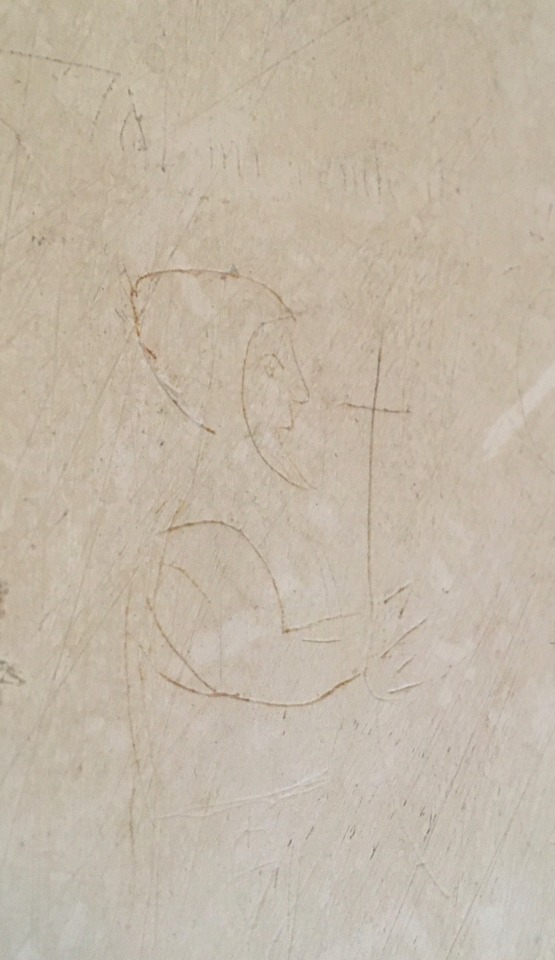
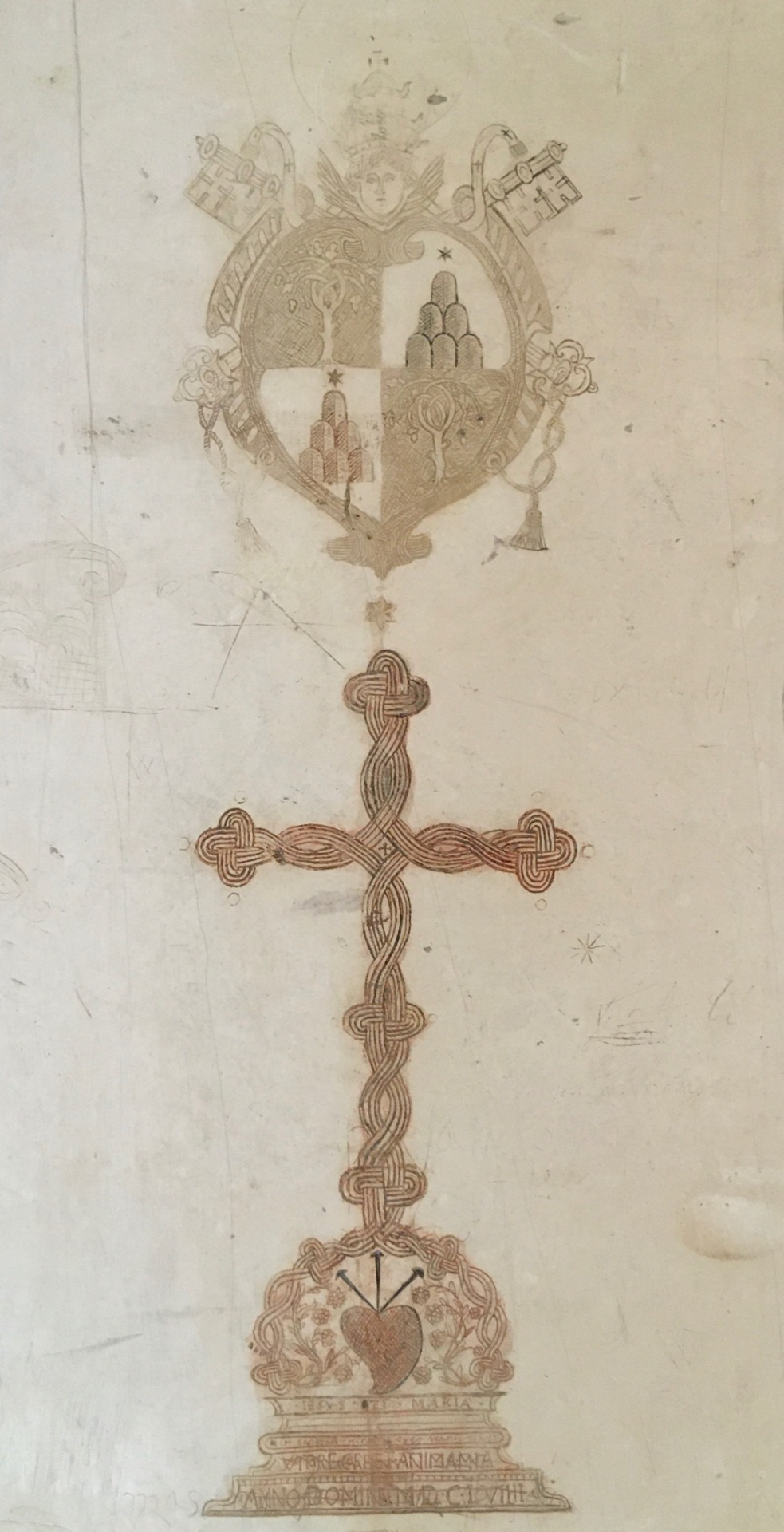
A religious man, possibly belonging in one of the several confraternities of the city. // Two emblems. The time it took to carve such designs clearly says it was not a secret vandalizing act.
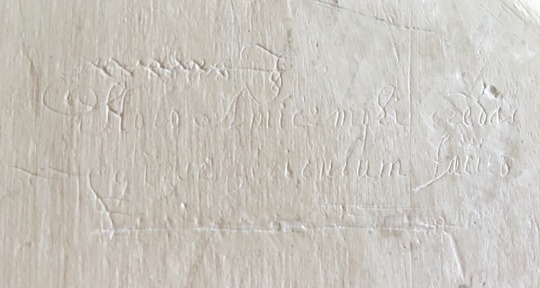
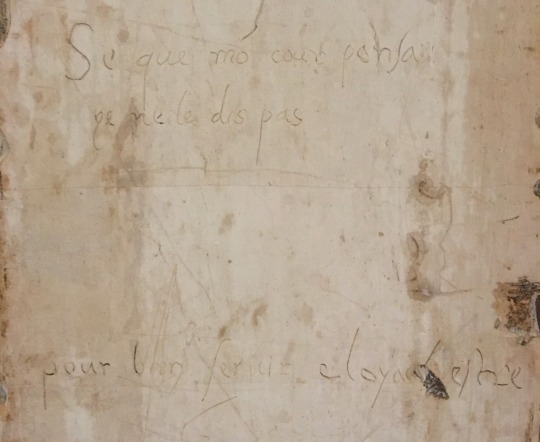
Solo amice mihi credas / lieve periculum facies. From (mostly correct) Latin: friend, believe to me alone / and the risk will be slight. // Se que mo cour pensa / ne me le dis pas / pour bien servir e loyail estre. From “French”: What my heart thinks / it does not tell me / to serve well and be loyal.
(Forgive my mistakes in transcribing and translating, by the way. I’m really not an expert.)
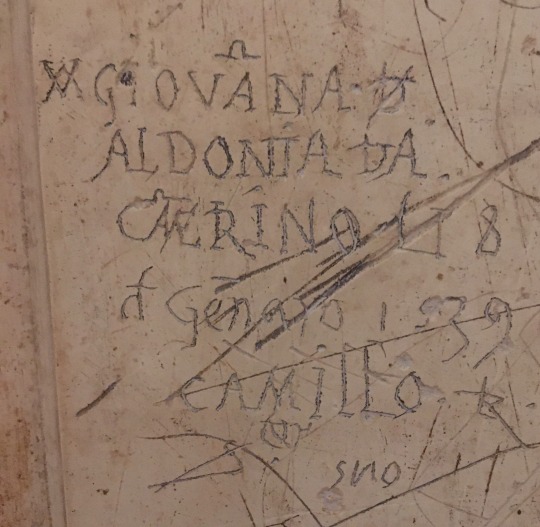
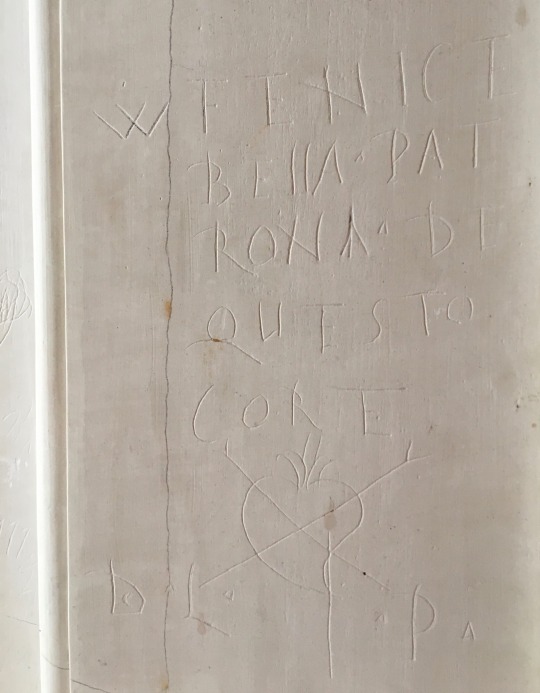
Love declarations!
W (= viva) Giovan(n)a [?] / Aldonia da / Camerino li 8 / di Gen(n)aio 1539 / Camillo R / suo. From Italian: Hooray for/long live Giovanna Aldonia from Camerino. January 8, 1539. Her Camillo R. // W Fenice / bella pat- / rona de / questo / core. From Italian: Hooray for/long live Fenice (literally “Phoenix”, maybe a pseudonym?), beautiful lady/owner of this heart.
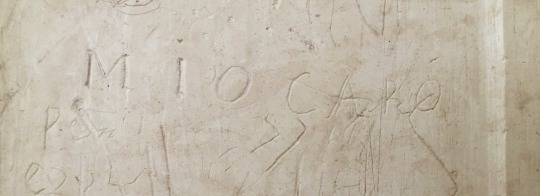
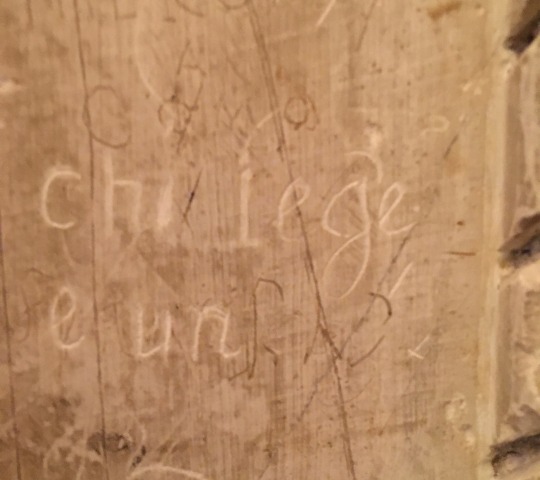
Mio caro. My dear (addressed to a man). // Chi lege / e un […?]. Who reads this / is a […?]
Thanks for trolling us from the past. Moving on.
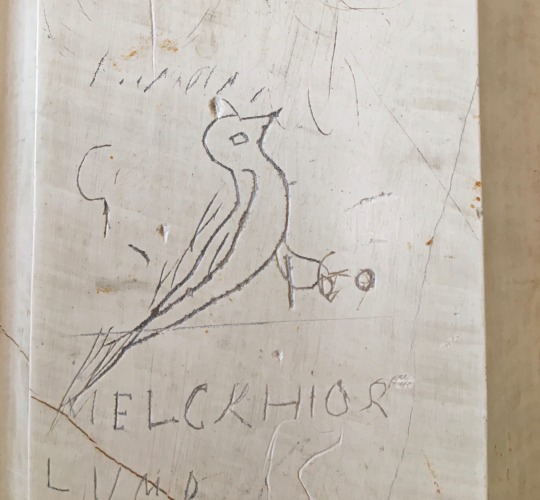
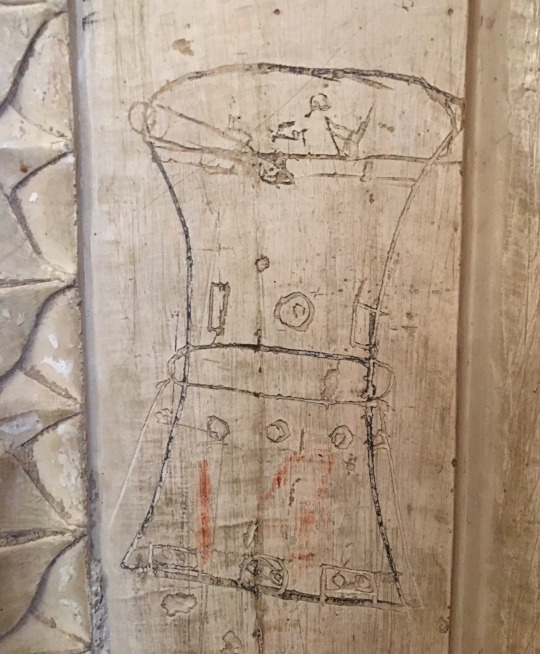
A bird! // Tower with a soldier and a cannon. Look at him.
#there is... so much more#but tumblr says i can't attach any more pictures#maybe i should add them by reblogging?#spoiler: there's symbols and dutiful servants and an incredibly interesting poem (my favorite)#and a soldier who finished his guarding duties#and drawings#and a lot of people#if you reached this point: thank you and i'm sorry#birdsong
3 notes
·
View notes